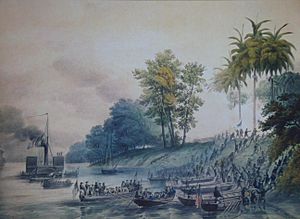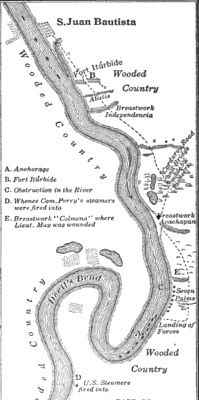Second Battle of Tabasco facts for kids
Quick facts for kids Second Battle of Tabasco |
|||||||
|---|---|---|---|---|---|---|---|
| Part of Mexican–American War | |||||||
 American landing in San Juan Bautista (Villahermosa today) during the Second Battle of Tabasco |
|||||||
|
|||||||
| Belligerents | |||||||
| Commanders and leaders | |||||||
| Strength | |||||||
| 8 vessels 1,050 U.S. Marines 7 field artillery pieces |
600+ Soldiers | ||||||
| Casualties and losses | |||||||
| 6 wounded, 3 missing |
about 30 | ||||||
The Second Battle of Tabasco, also called the Battle of Villahermosa, happened in June 1847. It was part of the Mexican–American War. The United States was trying to stop supplies from reaching Mexico by blocking their ports on the Gulf of Mexico. This battle was a key part of that effort.
Contents
Why the Battle Happened: The Background
Commodore Matthew C. Perry was a commander for the U.S. Navy. He had already captured important port cities like Tuxpan and Carmen. His next goal was to take San Juan Bautista. This city is now known as Villahermosa and was the capital of the state of Tabasco.
In April, Perry learned that the Mexican commander in Tabasco, Colonel Domingo Echagaray, had made the city's defenses stronger. He also heard that the Mexicans had put obstacles in the Tabasco River. This river is now called the Grijalva River.
Perry gathered his ships, known as the Mosquito Fleet. This fleet included several steamboats and brigs. On June 14, they met near Frontera. From there, they started moving up the river. They towed 40 smaller boats carrying 1,050 soldiers. These boats also had seven field artillery pieces, which are like small cannons.
The Battle Begins: River Fights
On June 15, at 4:15 PM, Perry's fleet faced an ambush. This happened near Santa Teresa, about 12 miles (19 km) from San Juan Bautista. The fleet managed to get through with little trouble.
Later that day, at 5:45 PM, they reached a tricky part of the river. It was an "s" curve known as the "Devil's Bend." Here, Mexican forces fired at them from the thick bushes, called chaparral. Perry's ships fired back, scattering some Mexican cavalry. He decided to anchor for the night. He planned to deal with the river obstacles the next morning. As it got dark, a single Mexican shot one of Perry's men on a ship.
Taking the City: The Main Fight
On June 16, Perry's team started checking the river obstacles. One of his lieutenants, William May, was wounded. Perry then decided to lead 1,173 men and ten pieces of artillery ashore. They quickly took a place called Acachapan. Colonel Claro Hidalgo's 600 Mexican soldiers ran away, leaving their breakfast behind.
Meanwhile, Lieutenant David Dixon Porter was on a ship called the Spitfire. He managed to remove the large piles that were blocking the river. By 10 AM, the steamboats could move past the obstacles. At one point, Porter accidentally fired on Perry's own American troops. He thought they were the Mexican forces. The mistake was quickly fixed.
Porter continued moving upriver. Soon, he reached Fort Iturbide, which guarded the city from the riverbank. Two ships, the Scorpion and Spitfire, sailed past the fort. They started shelling it from behind. Porter then led 68 men ashore. They captured the fort and raised the American flag. The steamboats kept going and captured the town. By 11:50 AM, the U.S. flag was flying over the governor's house. Perry and his landing force arrived at 3:30 PM.
What Happened Next: Aftermath
With this victory, the last Mexican port on the Gulf coast was captured by the U.S. Colonel Echagaray, the Mexican commander, retreated further upstream with his remaining soldiers and some civilians. However, guerrilla fighters stayed behind. These were small groups of fighters who used surprise attacks.
Perry left a group of soldiers in Tabasco, led by Commander Gershom Jacques Van Brunt. But yellow fever, a serious illness, and constant attacks from the guerrillas made Perry change his mind. On July 22, he decided to pull his soldiers out of the city. However, he kept the blockade at Frontera. He also sent ships to patrol the river regularly.
After the U.S. victory, some people in Tabasco and Chiapas wanted their states to leave Mexico. They hoped to join with Guatemala. But Perry did not support this idea, and the movement eventually faded away.
See also
 In Spanish: Segunda batalla de Tabasco para niños
In Spanish: Segunda batalla de Tabasco para niños
 | Chris Smalls |
 | Fred Hampton |
 | Ralph Abernathy |


